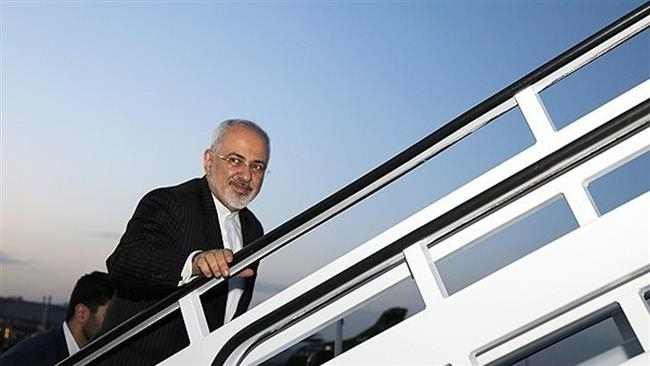PHOTO: Iranian Foreign Minister Mohammad Javad Zarif departs for New York on Thursday
LATEST
- Head of Armed Forces Joins Criticism of Rafsanjani
- Head of Basij Militia Attacks “Aristocratic” Rafsanjani
Hours before an international conference on Syria, Iran has dismissed the notion of an “opposition” which can enter negotiations with the Assad regime.
Last week, Saudi Arabia hosted a conference which agreed on an opposition-rebel bloc, naming both leadership and negotiating committees.
However, Iranian Foreign Minister Mohammad Javad Zarif said as he arrived in New York that there is still no consensus on which groups should comprise the “opposition” and which should be labelled as “terrorist”:
There has been no agreement on two important aspects. One is the opposition groups and the composition of the opposition groups and second is the list of terrorist organisations.
Zarif’s line is in contrast to that of Russia, the Assad regime’s other major ally. Russian Foreign Minister Sergei Lavrov said after meeting US Secretary of State John Kerry on Wednesday that the two sides are moving closer over the lists. Russian President Vladimir Putin said on Thursday, “Russia’s plan for a resolution to the situation in Syria coincides in its main points with that of the United States.”
Iran has insisted that President Assad must be allowed to stand in elections during a political transition. Moscow has not gone as far, saying only that Assad should hold power for some time, still undefined, during negotiations and implementation of ceasefires, opposition-regime talks, and a new Constitution before the elections.
Unnamed Western diplomats put out the line on Thursday that Russia is ready to agree on the Syrian President’s departure:
What you’ve got is a move that will end up with Assad going.
And the Russians have got to the point privately where they accept that Assad will have gone by the end of this transition, they’re just not prepared to say that publicly.
Zarif indicated that Iran will press for an “acceptable” opposition, without specifically addressing the composition of the bloc from the Saudi Arabian conference:
I believe the opposition should be serious and inclusive so that they could engage in serious talks. We have suggested a national unity government a long time ago and we hope that this can in fact become a serious exercise, including various opposition groups not just one inclination within the opposition.
However, he used an opinion piece in London’s The Guardian to attack the Saudis and their maneuvers with the opposition:
It is utterly absurd that those who have denied their own population the most rudimentary tenets of democracy, such as a constitution and elections, are now self-declared champions of democracy in Syria. Their democracy, however, is not to give Syrians a voice, but instead to thwart the political process by stonewalling a ceasefire, while pushing for self-proclaimed al-Qaida affiliates to have a prominent place at the negotiating table.
Head of Armed Forces Joins Criticism of Rafsanjani
The head of Iran’s armed forces has joined attacks on former President Hashemi Rafsanjani, challeging suggestions that the Assembly of Experts can exercise greater supervision over the activities of the Supreme Leader and that the Leader can eventually be replaced by a council.
“We never had a council of leaders in history or a council that commands the army,” said General Hassan Firouzabadi, according to the Fars website of the Revolutionary Guards. He added:
All the plots have failed, now they have resorted to the new trick of a council of leaders … to undermine our progressive and stable leadership.
If the leadership becomes a council the country would suffer. And our strong unity against America, Zionists and imperial enemies would collapse.
Head of Basij Militia Attacks “Aristocratic” Rafsanjani
The head of the Basij militia, Mohammad Reza Naqdi, has launched an attack on former President Hashemi Rafsanjani and officials of the Rouhani Government.
Declaring that enemies are “disguising themselves as friends of Iran”, Naqdi denounced “some members of the administration’s Cabinet” and continued, “An individual who has an aristocratic lifestyle and has a child studying in the UK – how can he want to understand the pain of the people?”
Rafsanjani, who was President from 1989 and 1997 and is now a close ally of President Hassan Rouhani, is known for his wealth. His son, Mehdi Hashemi, was registered for a Ph.D. at Oxford University before he returned to Iran in September 2012 to face charges linked to his financial activity and the disputed 2009 Presidential election.
Rafsanjani has been attacked by hardliners since his support of the right to protest following the 2009 election, but the tension has escalated this autumn ahead of February’s vote for Parliament and the Assembly of Experts.
The former Rafsanjani raised the stakes farther last week when he said the Assembly, which he chaired from 2007 to 2001, should exercise more supervision of the Supreme Leader. He also repeated his suggestion that the Leader could be replaced by a council after Ayatollah Khamenei’s death.
See Iran Daily, Dec 15: Rafsanjani Makes a Political Challenge

